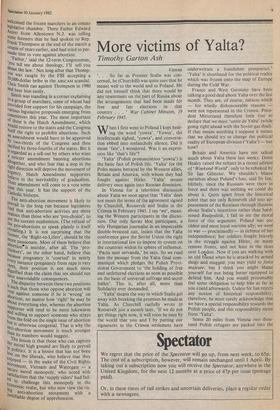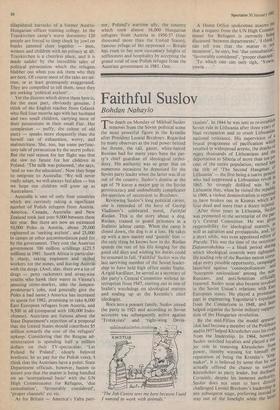More victims of Yalta?
Timothy Garton Ash
Vienna . So far as Premier Stalin was con- cerned, he (Churchill) was quite sure that he meant well to the world and to Poland. He did not himself think that there would be any resentment on the part of Russia about the arrangements that had been made for free and fair elections in that country . . ' War Cabinet Minutes, 19 February 1945.
When I first went to Poland I kept hear- ing the word 'yowta'. 'Yowta', the intellectuals sighed, 'yowta', and conversa- tion ebbed into melancholy silence. Did it mean 'fate', I wondered. Was it an expres- sion like 'that's life'?
`Yalta' (Polish pronunciation 'yowta') is the basic fact of Polish life. 'Yalta' for the Poles means betrayal by the Western allies, Britain and America, with whom they had fought against Hitler. 'Yalta' means delivery once again into Russian dominion.
In Vienna for a television discussion about Yalta we soon agree that 'Yalta' does not mean the terms of the agreement signed by Churchill, Roosevelt and Stalin in the Crimea in February 1945. I say 'we', mean- ing the Western participants in the discus- sion. Our only Soviet bloc participant, a wily Hungarian journalist in an impeccable double-breasted suit, insists that the Yalta conference gave the Soviet Union the right in international law to impose its system on the countries within its sphere of influence. 'Pacta sunt servanda,' he says. So we read him the passage from the Yalta final com- munique which pledges the Polish Provi- sional Government to 'the holding of free and unfettered elections as soon as possible on the basis of universal suffrage and secret ballot'. This is, after all, more than Solidarity ever demanded.
`Yalta' means the way in which Stalin got away with breaking the promises he made at Yalta. As Churchill ruefully wrote to Roosevelt just a month later, 'If we do not get things right now, it will soon be seen by the world that you and I by putting our signatures to the Crimea settlement have underwritten a fraudulent prospectus.' 'Yalta' is shorthand for the political reality which was frozen onto the map of Europe during the Cold War.
France and West Germany have been talking a good deal about Yalta over the last month. They are, of course, nations which — for wholly dishonourable reasons were not represented in the Crimea. Presi- dent Mitterrand therefore feels free to declare that we must 'soak de Yalta' (while going right'ahead with the Soviet gas deal). If that means anything I suppose it means that we should try to change the political reality of European division ('Yalta') — but how?
Britain and America have not talked much about Yalta these last weeks. Denis Healey raised the subject in a recent edition of Weekend World', only to be rebuked by Sir Ian Gilmour. We shouldn't blame ourselves about Poland's loss, said Sir Ian, blithely, since the Russians were there in force and there was nothing we could do about it. Quite apart from the historical point that not only Roosevelt slid into ap- peasement of the Russians through illusions about Stalin's intentions rather than hard- nosed Realpolitik, I fail to see the moral force of this argument. Poland was our oldest and most loyal wartime ally; we went to war — proclaimedly — in defence of her independence; her soldiers fought bravely in the struggle against Hitler, on many remote fronts, and not least in the skies over London. Now if you are walking with an old friend when he is attacked by armed thugs and mugged, you may yield to force majeure, but I think you might blame yourself for not being better equipped to defend him. And you would presumably feel some obligation to help him as far as you could afterwards. Unless Sir Ian rejects any notion of historical responsibility, therefore, he must surely acknowledge that we have a special responsibility towards the Polish people, and this responsibility stems from 'Yalta'.
Some 20 miles from Vienna two thou- sand Polish refugees are packed into the dilapidated barracks of a former Austro- Hungarian officer training college. In the Traiskirchen camp's worst dormitory 120 people are forced to sleep cheek by jowl on bunks jammed close together — men, women and children with no privacy at all. Traiskirchen is a cheerless place, and it is made sadder by the incredible tales of political persecution which the refugees blabber out when you ask them why they are here. Of course most of the tales are un- true, or at least grotesquely exaggerated. They are compelled to tell them, since they are seeking 'political asylum'.
Yet the distress which drove them here is, for the most part, obviously genuine. I think of the English teacher from Gdansk who fled four months ago with her husband and two small children, carrying most of their possessions in their small Fiat. Her complexion — puffy, the colour of old putty — speaks more eloquently than she herself can of exhaustion, worry, and malnutrition. She, too, has some perfunc- tory tale of persecution by the secret police. But the real reason for her flight was that she saw no future for her children in Poland. 'The milk was poisoned,' she says, 'and so was the education'. Now they hope to emigrate to Australia: 'We will never really adapt, we will always feel alien — but we hope our children will grow up as Australians.'
Australia is one of only four countries which are currently taking a significant number of Polish refugees from Austria. America, Canada, Australia and New Zealand took just over 9,000 between them last year. But there are now an estimated 50,000 Poles in Austria, about 29,000 registered as 'seeking asylum', and 23,000 in camps or other accommodation paid for by the government. They cost the Austrian government 700 million schillings (£23.5 million) in 1981. South Africa is particular- ly sharp, taking engineers and skilled workers for the mines, and leaving Austria with the dregs. (And, alas, there are a lot of dregs — petty racketeers and street-wise youths who hawk their wares in Vienna's amazing street-market, take the lumpen- proletariat's jobs, and generally give the Poles a bad name.) America has increased its quota for 1982, promising to take 6,000 East European refugees from Austria, and 9,500 in all (compared with 100,000 Indo- chinese). Austrians are furious about the State Department's rejection of a proposal that the United States should contribute $5 million towards the cost of the refugees' upkeep. Considering that the Reagan ad- ministration is spending half a million dollars on their TV-spectacular, 'Let Poland be Poland', (dearly beloved brethren, let us pay for the Polish vote), I think that the Austrians have a point. State Department officials, however, hasten to assure you that the matter is being handled on an 'international basis' with the UN High Commissioner for Refugees, 'due consultation', 'favourably considered', 'proper channels' etc etc.
As for Britain — America's Yalta part-
ner, Poland's wartime ally, the country which took almost 16,000 Hungarian refugees from Austria in 1956-57 (four thousand more than the United States), famous refuge of the oppressed — Britain has risen to her now customary heights of selflessness and hospitality by accepting the grand total of one Polish refugee from the Austrian government in 1981. One.
A Home Office spokesman assures me that a request from the UN High Commis" sioner for Refugees is currently being discussed 'between departments'. 'I think! can tell you that the matter is Ott imminent', he says, but 'due consultation' 'favourably considered', 'proper channels '• To which one can only sigh, •Yowta, yowta . .



































 Previous page
Previous page